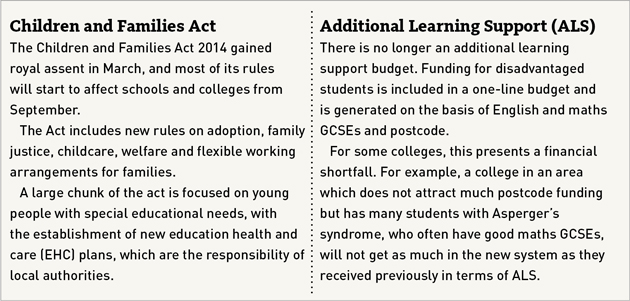The impact of a new law aimed at improving special needs provision in general FE and sixth form colleges could be limited by funding and capacity constraints, a sector leader has warned.
Alison Boulton (pictured), the chief executive of the Association of National Specialists Colleges (Natspec), has said a new legal obligation for colleges to accept learners with special educational needs (SEN) may create an extra financial burden.
Under the new rules, which are part of the Children and Families Act 2014, general FE and sixth form colleges will have to admit SEN learners if the college is named in their education health and care plan — drawn up with the help of local authorities (LAs).
Ms Boulton said: “There are two key challenges for colleges. One is linked to the duty to co-operate with LAs, which is important but as yet difficult to achieve in practice. Many LAs still focus on school issues at the expense of post-16 provision.
“The second is linked to the major funding reforms for high needs students and the loss of additional learning support in general FE colleges. The recent FE Week/Policy Consortium survey showed the extent of concern about these changes and the impact on students and colleges.
“It seems probable that the numbers of students seeking FE places will increase, because local authorities have not always undertaken proper assessments in the past. A number of these young people will request an education, health and care plan, which may well lead to significant funding problems for colleges as the local authorities’ high needs budget will not provide sufficient support.
“Overall, this is an important piece of legislation with the potential for real benefits for young people with learning difficulties or disabilities, but the risks associated with funding and capacity could limit its impact.”
Deborah Ribchester, senior policy manager at the Association of Colleges (AoC), said: “Colleges appreciate that they have new duties to admit students when named in their plan and are supportive of this, given the reciprocal duty on LAs to cooperate with colleges in the assessment and planning process.
“These changes are significant and will require new ways of working with LAs which are now both commissioners and funders of places for high needs students.”
A spokesperson for the Local Government Association said: “We already work with FE colleges and they are an important part of the local offer for all children and young people in our areas, including for those with SEN and disabilities.
“The act places a new burden on councils for a wide range of the reforms and we are negotiating these new burdens with government now.”
A Department for Education spokesperson said: “We are changing the law so that, for the first time, colleges have a legal duty to accept young people with special educational needs, if they request a place there.
“We have already provided councils with £70m to help them prepare for these changes. We have also provided guidance to all colleges on what these changes mean and will be providing them with extra money to cover any new costs that may arise.”










Your thoughts